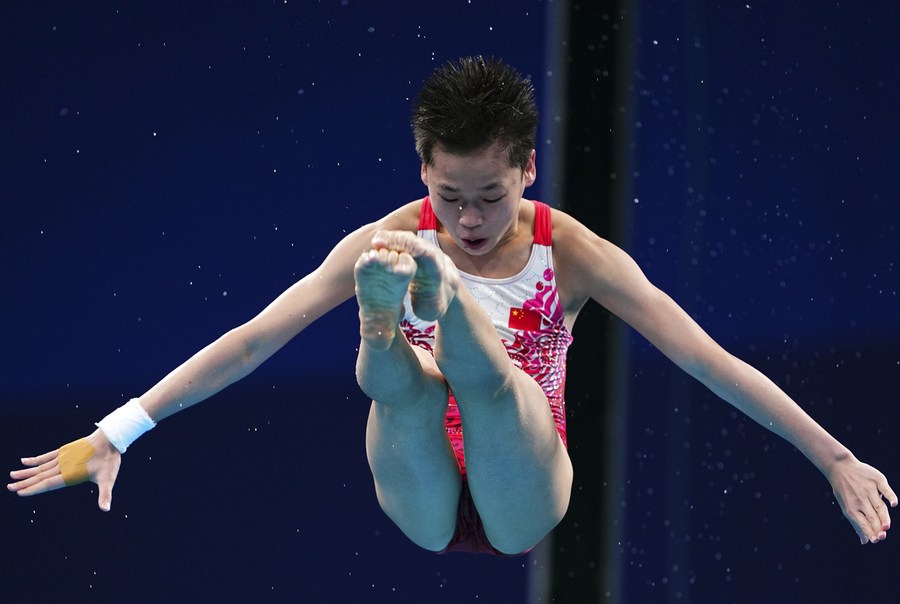Quan's remarkable rise causes ripple effect beyond pool
 0 Comment(s)
0 Comment(s) Print
Print E-mail China Daily, September 1, 2021
E-mail China Daily, September 1, 2021

Asked how it felt to be an Olympic champion, Quan Hongchan delivered a typically unorthodox response: "I felt a bit of pain under my arms," said the 14-year-old, in reference to the moment her coach hoisted her into the air after she claimed gold at Tokyo 2020.
Scoring three perfect-10s, the teenage diver won the women's 10-meter platform title with the highest score in history-466.20 points.
The victory has turned the youngest member of the Chinese delegation into a household name, with the public enchanted as much by her bubbly and frank personality as by her seemingly ripple-less entries into the water.
Her interviews have gone viral on Chinese social media, with her disarmingly sweet replies proving particular favorites with netizens, including such snippets as: "I want to go to an amusement park, play the claw machines and grab many dolls," and "I had a wish to own a small grocery store in my hometown, but now my dream is upgraded to a supermarket."
Hailing from the small village of Maihe in South China's Guangdong province, Quan started diving at the age of 7. She joined the provincial diving team in 2018, and made her Olympic debut in Tokyo just a few months after being selected for the national team.
While away from home, Quan always brings with her a stuffed toy with a big grin on its face, a gift from her older brother. "It kind of looks like me. We both have toothy smiles," she said with a giggle.
Quan is the third of five children from a family of modest means, but she never lacked for care or affection, shaping her into a grounded youngster with perseverance in abundance.
"I want to thank my parents for always encouraging me. They told me to be brave, and that it's OK if I can't get a medal," Quan said after claiming gold.
Quan's gratitude extended to Chen Huaming, who discovered the diving prodigy in Maihe, a village of fewer than 2,000 people.
Her success is also credited as an outcome of China's poverty eradication and rural vitalization initiatives that have been implemented in conjunction with the government's mass fitness drive.
Guangdong, for instance, has installed sports and fitness facilities in all of its 19,498 administrative villages, enabling rural children to develop an interest and find their talent in sports.
The State-sponsored network to scout athletic talent also provides opportunities for young people to choose competitive sports as a career, Chen said.
The sports and education authorities have instructed that preferential policies be put in place to give athletes a better chance to receive a quality education and find jobs once their sports careers end.
Such measures facilitate the all-round growth of athletes. When she's not training, Quan attends academic classes and has time for hobbies such as skateboarding and dancing.
Quan is among a growing number of Chinese athletes who, mainly thanks to social media, have connected with the public beyond the athletic arena. Compared with their predecessors, young athletes today have more resources and are more willing to open up about their lives away from the sports field.
Many Team China athletes have been keeping their Weibo followers up-to-date on their lives during their quarantine periods after returning from Tokyo. Posts hashtagged "athletes' quarantine diaries" have attracted over 850 million views.
Amid all the fame and attention, Quan still has much to navigate in her fledgling career-beginning with this month's National Games in Xi'an, Shaanxi province. And she's already thinking of defending her Olympic title in Paris in three years' time. "I want to stand on the top of the Olympic podium again," she said.






Go to Forum >>0 Comment(s)